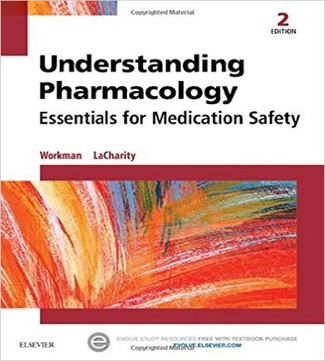This is completed downloadable of Understanding Pharmacology Essentials for Medication Safety 2nd Edition Workman LaCharity Test Bank

Product Details:
- ISBN-10 : 9781455739769
- ISBN-13 : 978-1455739769
- Author: Workman LaCharity
- NEW! Body system organization helps readers better understand drugs that are specific to particular body systems.
- NEW! More chapter review questions have been added to the text. All review questions are now organized into one of two categories: Test Yourself on the Basics and Test Yourself on Advanced Concepts.
Table of Content:
Chapter 03: Mathematics Review and Introduction to Dosage Calculation
Workman & LaCharity: Understanding Pharmacology: Essentials for Medication Safety, 2nd Edition
MULTIPLE CHOICE
1. What is the most important consideration when using a calculator for drug dosages?
a. Always check the answers with a pharmacist.
b. Ensure the numbers are entered in the correct order.
c. Work the problem by hand and then check all work using the computer.
d. Calculate the answer with the computer and then check the answer by working the problem by hand.
ANS: B
Remember that math problems are punched into the calculator just like they are written or just like you would say them out loud. For example, 24 ? 12 is punched in as 2, 4, ?, 1, 2 = answer. If you punch in either of the numbers backward (e.g., 4, 2, ? 1, 2 or 2, 4, ?, 2, 1) the answer will be wrong.
DIF: Cognitive Level: Remembering REF: p. 46
2. What is the best definition of a fraction?
a. Part of a whole number obtained by dividing one number by a larger number.
b. The answer obtained when one number divided another number is always an even number.
c. The smallest unit or part of a number that can be obtained by dividing one number by itself.
d. The dividing point between whole numbers and parts of numbers in a system based on units of ten.
ANS: A
A fraction is always a part of a whole number. A proper fraction is always less than a single whole number.
DIF: Cognitive Level: Remembering REF: p. 46
3. In the equation 2X = which element is the numerator?
a. 2
b. 4
c. 6
d. X
ANS: B
The numerator is always the top number in a fraction that will be divided by the bottom number (denominator).
DIF: Cognitive Level: Remembering REF: p. 46
4. What does the “N” indicate in the PINCH high alert drugs?
a. Narcotics
b. Niacin
c. Naphthalene
d. Neurotransmitter
ANS: A
The PINCH term for high alert drugs stands for potassium, insulin, narcotics (also known as opioids), cancer chemotherapy drugs, and heparin or any other drug that strongly affects blood clotting. Niacin is a vitamin. Naphthalene is a poisonous organic chemical that is never used as a drug. A neurotransmitter is a class of biologic chemicals the body makes and uses to control nerve impulses.
DIF: Cognitive Level: Remembering REF: p. 46
5. Which term is used to describe the bottom number of a fraction?
a. Denominator
b. Subtractor
c. Numerator
d. Dividend
ANS: A
The top of a fraction is the numerator, the bottom is the denominator.
DIF: Cognitive Level: Remembering REF: p. 46
6. Which statement about an improper fraction is true?
a. It is always greater than 1.
b. It has no lowest common denominator.
c. It cannot be multiplied or divided by another fraction.
d. It can only be multiplied or divided by a whole number.
ANS: A
An improper fraction is one in which the numerator is greater than the denominator. Therefore, the value of an improper fraction is always greater than 1.
DIF: Cognitive Level: Remembering REF: p. 47
7. The term “percent” is related to which number?
a. 5
b. 10
c. 50
d. 100
ANS: D
The expression of how a number is related to 100; “literally for each hundred.”
DIF: Cognitive Level: Remembering REF: p. 53
8. What is the first step in dividing two fractions?
a. Ensuring both numbers are proper fractions
b. Converting the numerators into their lowest common number
c. Converting the denominators into their lowest common number
d. Inverting the second fraction and multiplying the numerators separately from the denominators
ANS: D
Dividing fractions is almost exactly the same as multiplying fractions. The only difference is that the second fraction is always inverted first (changing the positions of the numerator and the denominator).
DIF: Cognitive Level: Remembering REF: pp. 49-50
9. Which statement about the relationship between fractions and decimals is true?
a. A fraction can be expressed as a decimal but a decimal cannot be expressed as a fraction.
b. A decimal can be expressed as a fraction but a fraction cannot be expressed as a decimal.
c. All fractions can be expressed as decimals and all decimals can be expressed as fractions.
d. Fractions can only be expressed as decimals if they are proper fractions.
ANS: C
Decimals and fractions are related because they are both parts of a whole. All fractions, whether they are proper or improper, can be correctly expressed as a corresponding decimal. All decimals can be correctly expressed as fractions.
DIF: Cognitive Level: Remembering REF: p. 50
10. Which dosage expression should be avoided?
a. 0.25 mg
b. 2.5 mg
c. 2.500 mg
d. 25 mg
ANS: C
The zeros after a decimal point serve no purpose and are known as “trailing zeros.” When they are written as part of a dosage, they can contribute to confusion about the exact dose.
DIF: Cognitive Level: Remembering REF: p. 50
11. What specific safety technique is always used when calculating an insulin dose?
a. Use a calculator and never calculate the dose by hand.
b. Calculate the dose by hand and never use a calculator.
c. Have another health care professional check the dose.
d. Wear sterile gloves to administer the calculated dose.
ANS: C
Insulin is a high alert (PINCH) drug that can cause serious damage if the wrong dose is administered. Always have another health care professional double check the dose you calculate by independently recalculating the dose and comparing it to the dose you calculated.
DIF: Cognitive Level: Understanding REF: p. 46
12. Which fraction represents the whole number 10
People Also Search:
understanding pharmacology essentials for medication safety 2nd
understanding pharmacology essentials for medication safety 2nd edition
understanding pharmacology essentials for medication safety 2nd edition pdf
understanding pharmacology essentials for medication safety 2nd edition download scribd





